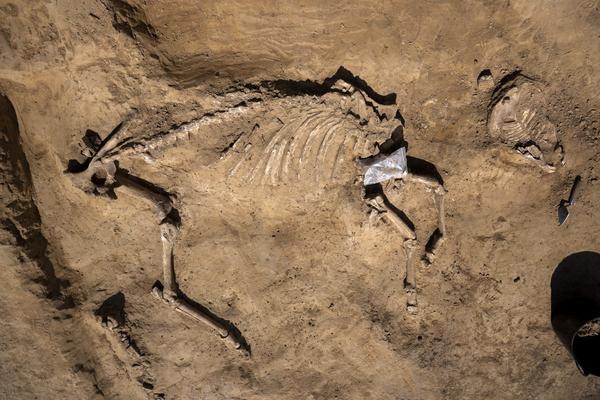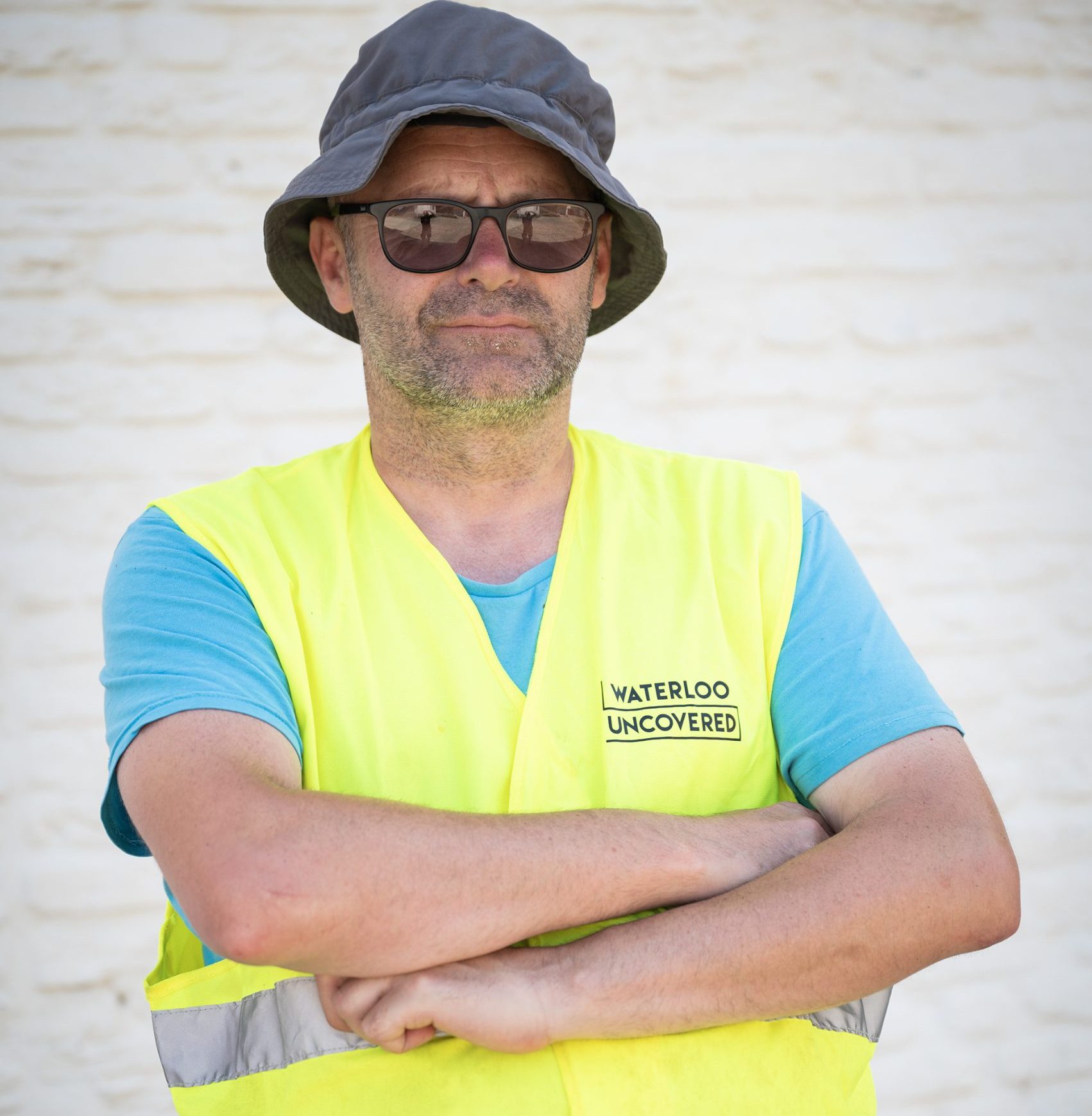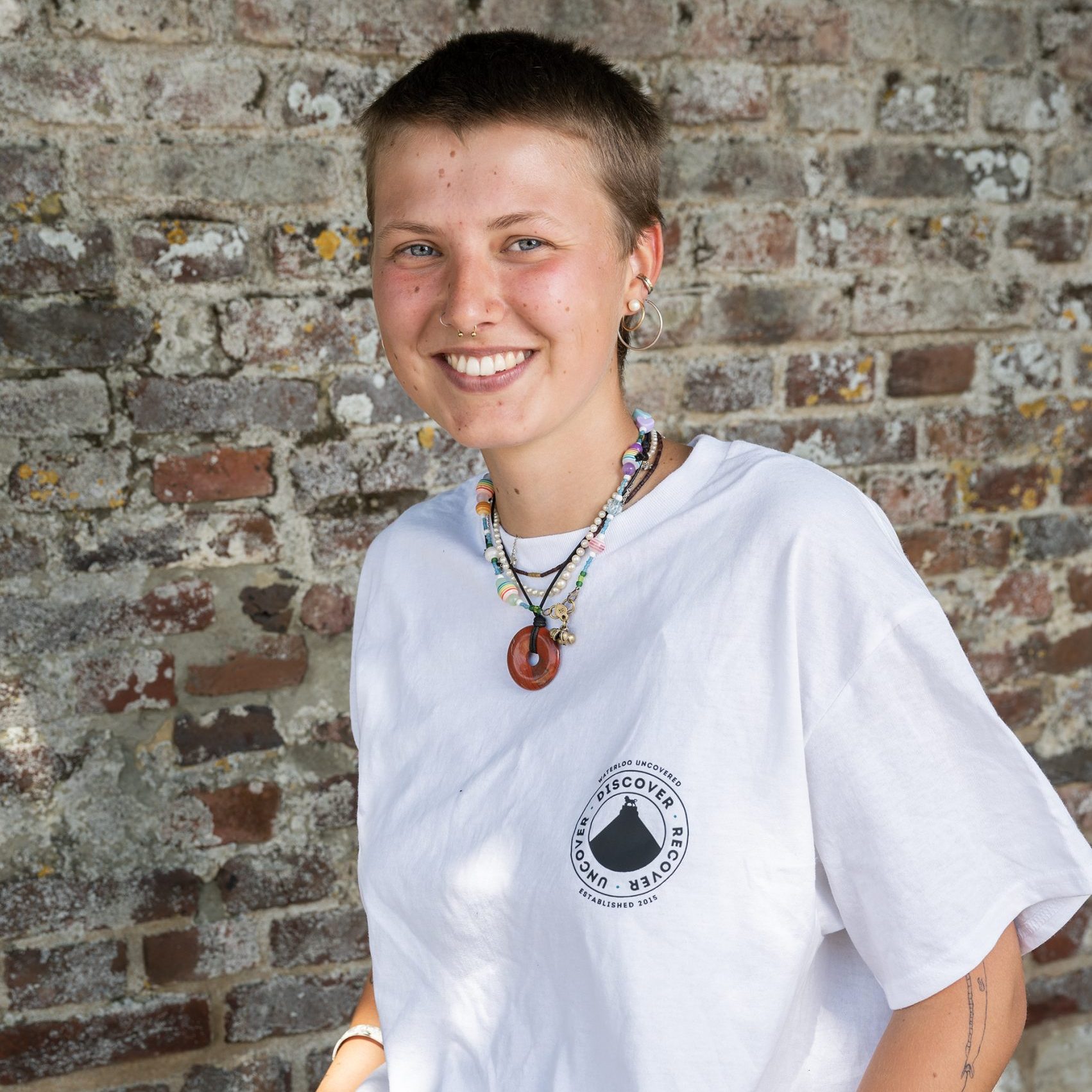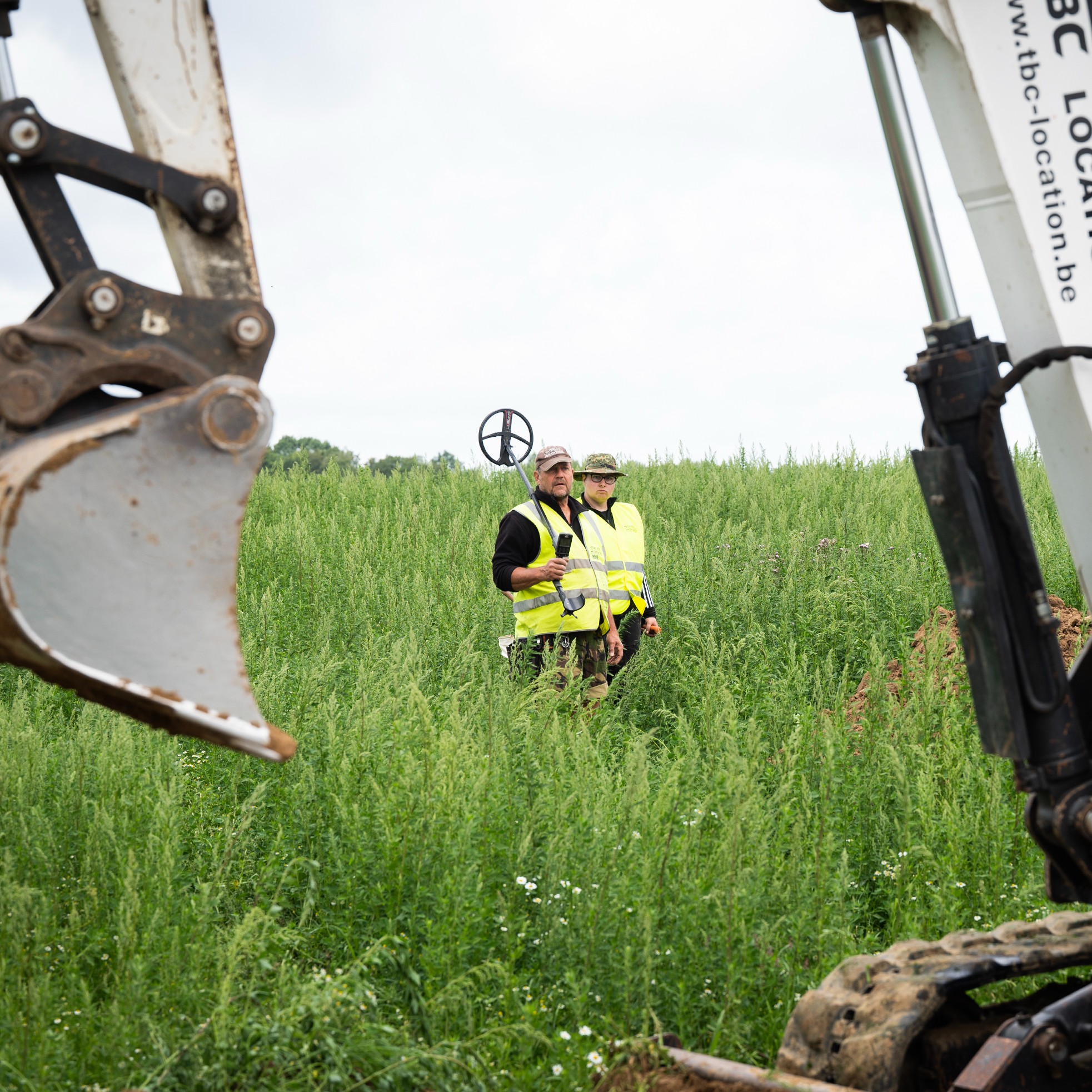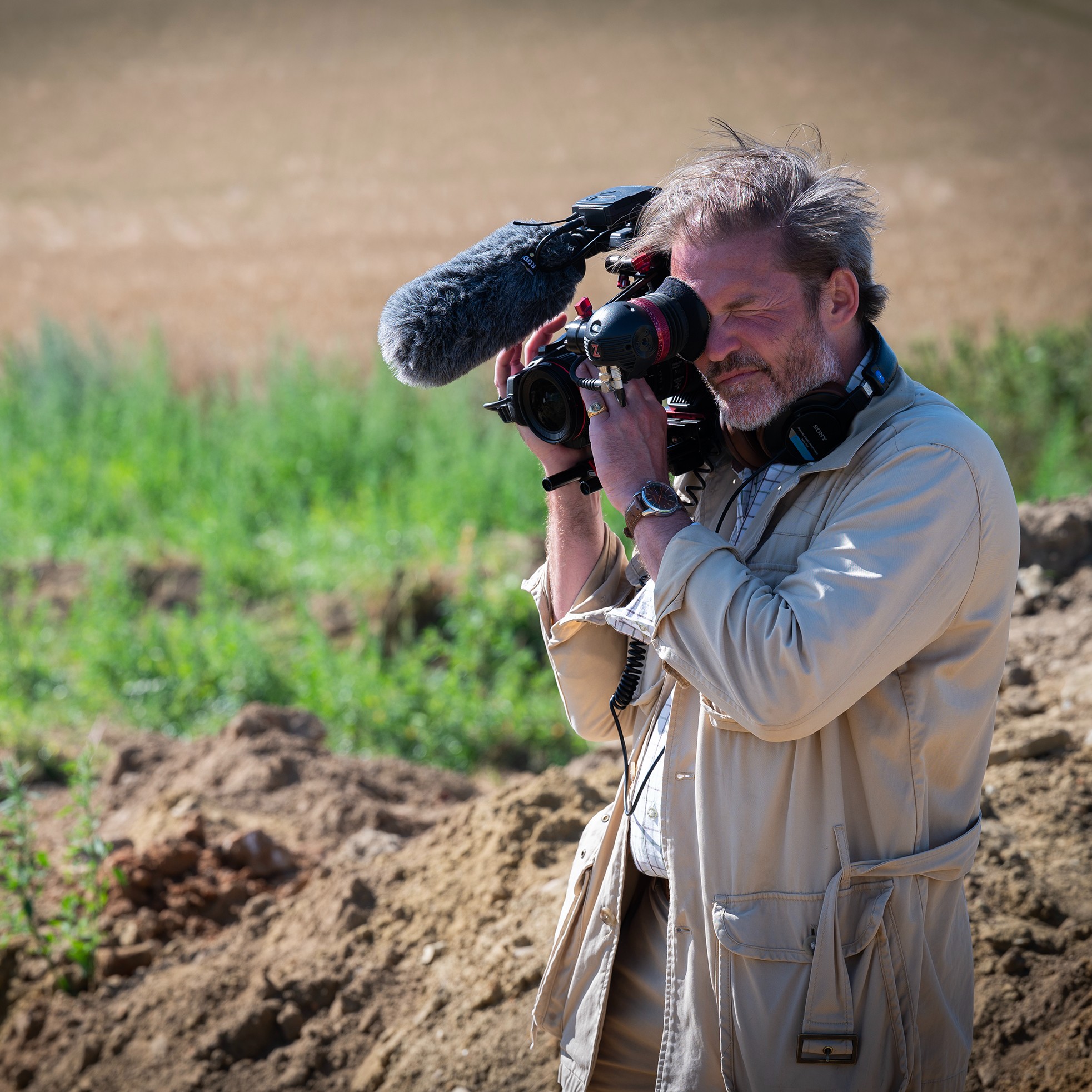Welcome to the latest edition of Waterloo Uncovered’s Dig Diary
By Hattie Ford
In the spring edition of our Dig Diary:
• One of the last surviving witnesses of Waterloo has fallen, presenting a unique opportunity for archaeological investigation;
• A spotlight on our 2021 programmes, including Battlefields Uncovered;
• We recap our successful fundraising event, An Evening Uncovered.
A Fallen Veteran of Waterloo

Three majestic Chestnut trees have stood guard over the Waterloo battlefield for centuries. We’re sad to report that as of the 11th of March, only two chestnuts remain standing. The fallen tree lies between its two surviving peers outside the gates of Hougoumont farm, protected from souvenir hunters by a new fence and regular surveillance. Although the loss of such an iconic symbol of the battle has upset many, it will provide a unique opportunity for in-depth archaeological investigation that would not have been possible while the tree remained standing.
According to the Memorial of Waterloo 1815 museum which reported on the fall shortly after it occurred, one of the petrified trees (situated in the middle of the living tree and the other dead chestnut) had already been looking worse for wear in recent weeks, and was leaning heavily to one side. The area around the battlefield had been subject to repeated heavy rain for months, and a partial landslide of wet ground beneath the chestnuts had weakened the roots of the middle tree. In the early hours of the morning, the tree finally fell, after valiantly holding on through several storms. The hollow, petrified trunk shattered upon impact with the tree to its left, which is still living. Fortunately, those on site have reported that the living tree was undamaged.
In the afternoon, Dominique Bosquet, the Archaeological Director for both AwAP (L’Agence wallonne du Patrimoine) and Waterloo Uncovered, Antoine Charpagne, the Cultural Affairs Manager for Kléber Rossillon, and WU trustee Michael Mitchell visited the site to assess the situation.
“The fall of the tree presents all sorts of opportunities for archaeologists,” Dominique explains, “We’re planning to carry out scientific research on the tree, and hopefully to preserve the parts of it as a relic of the battle.”

This research will include a metal detector survey of the fallen trunk, to recover any musket balls that may still be embedded within. But this survey will be much more than just the simple retrieval of musket balls – the evidence uncovered could change our understanding of the desperate fighting that took place outside Hougoumont, as Dominique explains:
“The signs so far are that the fire was hitting the tree from the North – from the walls of Hougoumont, and therefore fired by British and Allied troops, but if we were also to find French musket balls, in could mean that the fighting was much more fluid, and that French troops pushed well North of the tree.”
In addition, dendrochronological investigation will be carried out on the trunk of the fallen tree. This will involve taking a cross section of the wood to examine the growth rings within, in order to determine the age of the tree.
The two remaining trees will be subject to a 3D scan to preserve them for the future, and measures will be taken to see how they can be secured in the case of future storms.
“The tree is an emotional touchstone. Long after the bodies and the artefacts were removed from the battlefield, it stood as a living connection with the events. As does the surviving living tree. It was a symbol of the devastation wrought during the battle, almost like a relic. It’s been a backdrop for WU’s work on the site since 2015 and I feel a personal sense of loss. In addition to the monuments in stone and the buildings that still stand, this tree was a living memorial.”
Professor Tony Pollard, WU Archaeological Director.
Read more using the button below – this article will be updated as investigations progress:
Spotlight on Programmes
Unfortunately, we won’t be able to dig in Belgium this summer due to Coronavirus restrictions. In order to continue supporting Veterans and Serving Military Personnel (VSMP), we will be running the highly successful Virtual Programme first introduced in 2020 again this year.
This programme will provide VSMP with fascinating lectures, seminars and group discussions throughout the summer, focussing on the holistic side of archaeology, honing in on mental wellbeing and offering the space for VSMP to engage with a new group of people, virtually, in a time of mental hardship and stress. WU’s professional and experienced Wellbeing & Support team will be with our participants every step of the way.
“The Virtual Programme that was run by Waterloo Uncovered was absolutely phenomenal. I’ve made dozens of friends online – they’re not just virtual friends, they’re real friends. The stuff that I’ve learnt has been incredible – I’ve even transferred my Architecture degree to an Archaeology degree because of Waterloo Uncovered’s Virtual Programme. It was amazing.”
Paul, 2020 Virtual Programme participant

In addition, we’ll be running two brand new programmes in 2021, funded by Positive Pathways grants: one focussing on finds including handling, identification and photography, and another focussing on creative arts and writing.
We will also be running our annual Battlefields Uncovered course in collaboration with Utrecht University once again.

Since 2018, VSMP who take the Battlefields Uncovered course have been digging deeper into iconic battlefields like Waterloo and a variety of past conflicts which are still remembered today. This fascinating course helps VSMP to recognise their existing transferable skills, build new ones, and gain the confidence and connections to make use of them within and beyond the course. No prior knowledge or experience is necessary, just a drive to learn more and share ideas.
Originally a residential programme, Covid-19 forced us to move online in 2020. This proved to be a happy accident. Not only did participants report the same positive experiences of learning and meeting like-minded people, but the course became much more accessible too. International participants joined us from Lima to Okinawa; and participants ranged from teens to people in their 70’s. Although many were VSMP; students and other people with a range of backgrounds also took part. Bringing people together to share their interests and insights no matter what their background or experience remains at the heart of this programme. Exclusive interactive content from leading scholars and support from experienced tutors ensures a high-quality learning environment, and we are partnered with Utrecht University to ensure official accreditation as an entry level undergraduate course.
In 2021 the programme will begin in September and run through the autumn and winter. This is a time when many people can feel disconnected or lonely – but our friendly discussion groups and regular social events are designed to help combat this. Anyone needing extra support will be guided to appropriate organisations and professionals by our Welfare and Support team.
Find out more about our Programmes here:
An Evening Uncovered
On the evening of the 26th of February, the anniversary of Napoleon’s escape from Elba, Waterloo Uncovered was joined by hundreds of supporters for our virtual fundraising event, An Evening Uncovered. In addition to entertainment and a look at Waterloo Uncovered’s important work with veterans, the night featured a raffle with some fantastic prizes up for grabs, an auction in collaboration with Bonhams, and a viewing of the epic 1970 film Waterloo!
The night was hosted by Gyles Brandreth, who interviewed two exciting special guests: BAFTA-winning actress Virginia McKenna, and historian and broadcaster Peter Snow, who both spoke about the charity, the battle, and the film Waterloo in which Virginia portrayed the Duchess of Richmond.
The night also featured special messages from our patron the Duke of Wellington, our CEO Mark Evans, and several of the veterans that were supported through our virtual programme in 2020.
In total, we raised almost £55,000 between our event, raffle, auction and donations, thanks to the generosity of our supporters. Our work would not be possible without the support and donations of our audience, and this money will directly fund the Veteran and Serving Military Personnel Support Programmes we will run in 2021 to help veterans find peace from war, and our archaeological work on the battlefield of Waterloo.
If you couldn’t attend An Evening Uncovered, but would like to donate and help us continue our work, you can do so here:

